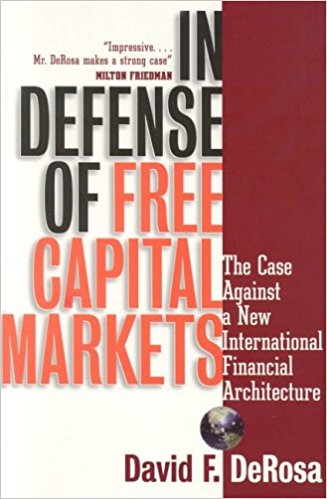In Defense of Free Capital Markets Summary
6 min read ⌚
 The Case Against a New International Financial Architecture
The Case Against a New International Financial Architecture
You might already know that, back in 1759, Adam Smith proposed the idea of the invisible hand. If you haven’t heard by now, the concept means that if free, the market will regulate itself without any external help.
In other words, the only thing the economy needs to thrive is for everyone to go about their business.
Strangely enough, even though free-market capitalism won the Cold War, this is not the case. This summary explains why. And if the title of the book doesn’t give away the author’s position, let us do it straightaway.
It’s the government’s fault.
Who Should Read “In Defense of Free Capital Markets”? And Why?
There are only a few things all people are unanimously afraid of. And financial crises are surely ranked very high on that list.
David F. DeRosa spends a lot of time and paper analyzing economic crises around the world.
His goal: to find out what has caused them in the past and how we can prevent them in the future.
His conclusion: it’s time to bring to an end to things such as misguided governmental regulations and poor fiscal policies.
For reasons such as this, it’s hard not to recommend this book to anyone even remotely interested in how the world of the economy works. But, it’s even harder to circumvent those who found themselves on the losing side of the economic crisis of 2008.
However, be warned! The book is a thought-provoking socio-political exegesis and, occasionally, uses somewhat tricky technical language. Students, managers, and executives interested in fiscal policy should have no problems with it.
Nonprofessionals, though, will need to flex their mental muscles seriously.
About David F. DeRosa
 David F. DeRosa received his Ph.D. in finance and economics from the University of Chicago. He is the founder and president of DeRosa Research and Trading Inc, a consulting and research firm. Since 2006, he is an adjunct professor of finance at Columbia University.
David F. DeRosa received his Ph.D. in finance and economics from the University of Chicago. He is the founder and president of DeRosa Research and Trading Inc, a consulting and research firm. Since 2006, he is an adjunct professor of finance at Columbia University.
DeRosa is the author of numerous books. Among them: Managing Foreign Exchange Risk (1996), Central Banking and Monetary Policy in Emerging Markets Nations (2009), Options on Foreign Exchange (2011), and Foreign Exchange Operations (2013).
“In Defense of Free Capital Markets Summary”
Learning about the past is not a passive activity. We learn about it so that we can analyze what went on and prepare better for what might happen next. Only by finding out the reasons behind our mistakes, we can find the right way never to repeat them again.
Learning from other people’s mistakes is undoubtedly better than learning from your own. For one thing, it’s much less painful. But, as David DeRosa proves in this book, it can also be much more illuminating.
How so?
Well, the United States didn’t have many economic crises of their own. But, other countries have had their fair share of problems. By analyzing what led to their recessions, DeRosa hopes to understand what’s a good way to organize the American – and any other – economy.
His research is primarily focused on the economic crises experienced in Japan, Europe, Mexico, South Asia and Brazil in the 1990s. By exploring them, DeRosa tries to find whether there’s one, underlying reason for all financial collapses.
And the bottom line?
Adam Smith was right. Markets are way smarter than governments. And when governments decide to meddle and try to regulate them – they merely cause problems. The freer the markets are, the healthier the economy is.
It seems that setting fixed exchange rates is one of the biggest mistakes a government can make. History shows that, instead of stabilizing the currency markets, it leads to severe economic problems. Stock market crashes, deflation, recession, exchange-rate complications… You name it.
Need a proof? DeRosa has more than one.
Take, for example, Japan. The second largest economy in the world, steadily on the rise since World War II. And then, in 1990, it all came crashing down. You’d think that the government should have prevented the decline, but, in fact, it was the government which caused it.
And here’s how it did it.
Sure, there was some inflation during the 1980s. But, the bubble burst in 1989 when the Bank of Japan tried to keep the inflation in check. To do this, it started buying dollars and raising interest rates. And that was the beginning of the Lost Decade, a period of stagnation from which the Japanese economy is yet to recover.
Europe’s “adventure” with fixed exchange rates didn’t go well either. Germany was first to experience the crisis. And since the German central bank was the anchor bank of the Economic Monetary System, Germany’s problems spread throughout Europe like wildfire.
Bear with us for one more example.
In the summer of 1997, South Asian governments unfairly blamed hedge funds and stock market circumstances for a critical economic plunge. DeRosa, however, delves a bit deeper into the problem. And, lo and behold, once again it is fixed exchange rates sitting at the root of the problem.
So, what’s the magic formula?
You’ve guessed it: a floating exchange rate. According to DeRosa, that’s the best way for a currency to adjust freely to the market flows, simultaneously and continuously correcting itself.
Singapore is an excellent example of how this might work. It was the only South Asian country not affected by the financial chaos. Why? For the simple reason that the government of Singapore didn’t introduce fixed exchange rates.
In fact, it did nothing. The free market did everything by itself.
If there’s one thing you should take away from this book – that’s it. Strict regulations will only create chaos and hinder economic development. And the financial crises of the 1990s are a perfect example of this.
Key Lessons from “In Defense of Free Capital Markets”
1. The Financial Crises of the 90s
2. Flawed Financial Policy
3. New Financial Architecture?
The Financial Crises of the 90s
The financial crises of the 1990s would not have happened if the government hadn’t interfered. Whether in Japan or Germany, in Latin America or Southeast Asia – governments consistently made the same wrong decisions.
The free market has a mind of its own. And, interestingly enough, it’s programmed not to make mistakes of this kind.
Flawed Financial Policy
The worst thing the governments of the crisis-hit countries did was introducing the fixed exchange rate.
They did it to achieve some stability in their markets. Unfortunately, this resulted in the exact opposite. Ironically, instead of acknowledging their mistake, most governments blamed the free market for the recession.
DeRosa thinks he has the facts on his side.
Because, the countries which remained unscathed during the economic crises (Singapore, South Korea) had two things in common. By now, you should know both by heart.
That’s right!
Floating exchange rates and the lack of government regulation.
A New Financial Architecture?
All this means that the world needs a new and improved financial architecture.
The trick is that it doesn’t need to be constructed by the government. On the contrary, the government should just move aside. As the examples prove, putting forced constraints just leads to economic catastrophes.
The market prices will adjust all by themselves in their absence. And floating exchange rates will help to beat any economic crisis.
Like this summary? We’d Like to invite you to download our free 12 min app, for more amazing summaries and audiobooks.
“In Defense of Free Capital Markets” Quotes
Fixed foreign exchange rate systems, but not floating systems, are in fact the breeding grounds for great financial crises. Share on X Financial crises largely can be explained by looking at the domestic policies that ministries of finance and central banks have laid out for their own countries. Share on X Practically all of the episodes of financial crisis in the 90s occurred in countries that had fixed exchange rate systems. Share on X Japan spent the entire decade of the 1990s in varying degrees of economic stagnation. Share on X Derivates are the principal tool that investors use to hedge foreign exchange risk. Share on XOur Critical Review
“In Defense of Free Capital Markets” is a structured and well-researched defense of free-market capitalism and laissez-faire economy. It is also an invaluable resource for anyone interested in the causes of the economic crises of the 1990s.
DeRosa digs deep to show that, as a rule, government interventions only make matters worse. Consequently, according to the author, it’s better to trust the invisible hand of the market.
However, not everybody will agree with DeRosa, and many may find his writing too technical and tiresome. Then again, we suppose, complicated affairs ask for complicated sentences.
Emir is the Head of Marketing at 12min. In his spare time, he loves to meditate and play soccer.


 The Case Against a New International Financial Architecture
The Case Against a New International Financial Architecture




